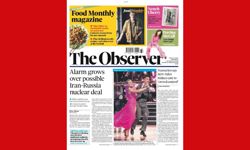The complaint followed publication of an article headlined "Fazer told me he didn't have a girlfriend - then we kissed", which was trailed on the magazine's cover with a claim that the complainant had "cheated" on his girlfriend at the time.
The article was an interview with a woman who claimed Mr Rawson had kissed her at a nightclub; she also claimed that he had denied to her that he had a girlfriend. Mr Rawson accepted that he had danced with the woman, but strongly denied that any kiss had occurred or that he had told her that he did not have a girlfriend. He said that the magazine should have approached his representative for comment before publication, rather than informing him of the claims only after the edition had gone to print.
The magazine said it had not approached the complainant's representatives for comment because it was confident of its story. It provided an affidavit signed by the woman and a witness statement from a freelance journalist who had taken photographs used to illustrate the story, in which he confirmed that he had witnessed the alleged kiss.
The Commission was unable to reconcile the conflicting versions of events provided by the complainant and the publication. It considered the matter under the terms of Clause 1 (i) of the Editors' Code of Practice, which states that "the press must take care not to publish inaccurate, misleading or distorted information..." It noted that the magazine had been unable to provide direct corroborating evidence of the kiss, such as a photograph, and concluded that the magazine's decision not to contact the complainant's representative about the story - which included "detailed claims about the complainant, including that he had been deceptive and unfaithful to his girlfriend" - prior to publication represented a failure to take care over the accuracy of the story under the terms of the Code. It upheld the complaint.
Charlotte Dewar, Head of Complaints and Pre-publication Services said: "Although the Code does not impose specific requirement of ‘prior notification', seeking comment from the subject of a story before publication may be a necessary step to ensure the accuracy of any resulting coverage. While the Commission was not able to reconcile conflicting claims from witnesses about what had happened at the club, it decided that in the full context - which included the nature of the claims and the prominence with which they were trailed to readers - the magazine's decision not to seek comment from the complainant's representative about the incident before publication breached the terms of Clause 1."
The complainant also raised concerns under Clause 3 (Privacy) of the Editors' Code about the publication of the photographs of the complainant and the woman dancing at the club. The Commission noted that the evening on which they had been taken had been a "press night"; in a witness statement provided by the complainant, the complainant's stylist had commented that it would have been "stupid" for the complainant to have kissed the woman in the presence of journalists. The Commission concluded that the complainant - a well-known musician - did not have a reasonable expectation of privacy in such a context and did not uphold the complaint under Clause 3.
To read the adjudication, please click here. The adjudication has been published in this week's edition of Heat magazine (issue 693; dated 18-24 August 2012).










